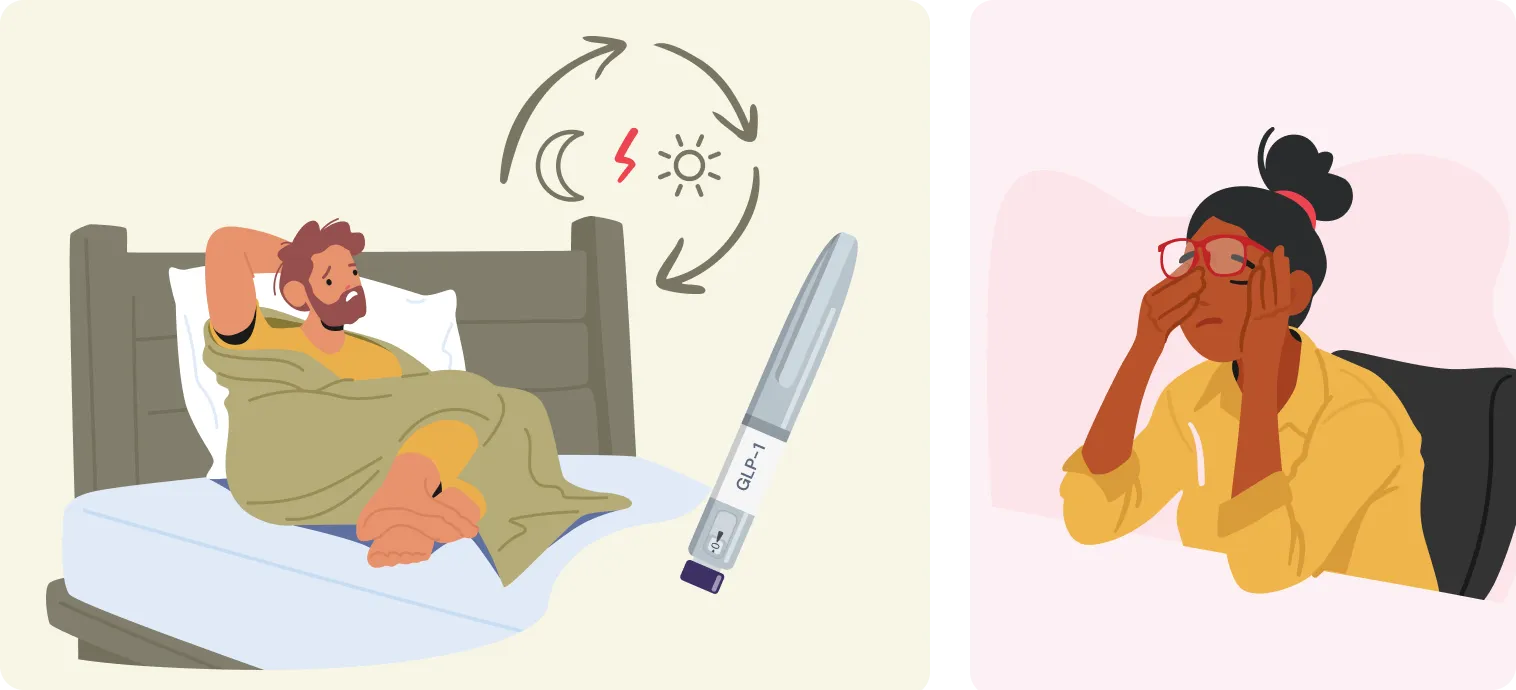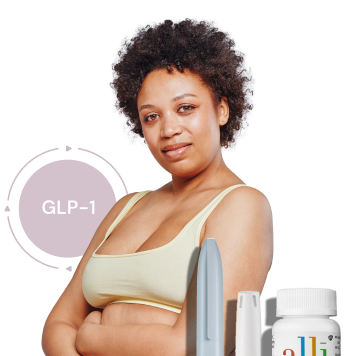Whilst not always mentioned in the list of common side effects, fatigue from GLP-1 injections is a real and frustrating experience for many people, especially during the early weeks of treatment.
That drained, sluggish feeling you’ve been experiencing isn’t just in your head. It can stem from several significant changes occurring in your body, including reduced calorie intake, shifting hormone levels, and rapid metabolic adjustments.
Read through this comprehensive information about fatigue from GLP-1 injections to better understand why it happens, when it typically occurs, and what you can do about it.

What Is GLP-1 Related Fatigue?
Fatigue goes beyond ordinary tiredness or feeling sleepy. It’s a persistent lack of physical or mental energy that doesn’t always improve with rest. You might feel drained throughout the day, struggle to concentrate, or feel like your body is operating in slow motion.
GLP-1-related fatigue often presents as:
- Persistent low energy despite adequate sleep
- Mental fog or difficulty concentrating
- Physical weakness or feeling “heavy”
- Lack of motivation for usual activities
- Energy that comes and goes in waves
- Feeling more tired after eating (or not eating)
This type of fatigue tends to feel different from ordinary tiredness and may fluctuate, especially around dose increases, significant dietary changes, or periods of rapid weight loss.
Why Does Fatigue Occur with GLP-1 Mediations?
GLP-1 medications work by slowing digestion, reducing appetite, and improving blood sugar control. These changes are powerful—but they can also affect your energy balance, especially if your food intake suddenly drops.
Here are the most common causes of fatigue in people taking GLP-1s:
- Reduced calorie intake – If you’re eating far less than before, your body might not be getting enough fuel to feel energised.
- Rapid weight loss – Your metabolism is adjusting quickly, which can leave you feeling depleted.
- Dehydration – Lower fluid intake, nausea, or vomiting can all contribute to tiredness.
- Electrolyte imbalances – Losing fluids or eating less can throw off important nutrients like sodium and potassium.
- Sleep disruption – Nausea or new eating patterns may interfere with your usual sleep quality.
- Low blood sugar – If you’re eating very little or exercising more, you may be experiencing mild hypoglycaemia, which can also make you feel faint or foggy.
Fatigue may be more noticeable after a dose increase or if you’re trying to maintain a very low-calorie diet while on the medication.
Timeline and Patterns
Fatigue from GLP-1 medications typically follows these patterns:
- Weeks 1-2: Initial fatigue as your body adjusts to appetite changes
- Weeks 2-4: May peak during dose titration periods (the planned, gradual increases in medication dosage used to help your body adjust safely to a new treatment)
- Weeks 4-8: Gradual improvement as eating patterns stabilise
- 8+ weeks: Most people experience significant improvement
Common triggers for fatigue episodes:
- Starting treatment or increasing doses
- Periods of very low food intake
- Rapid weight loss (more than 1-2 pounds per week)
- Illness or stress
- Changes in exercise routine
How to Manage Fatigue While Taking GLP-1s
If tiredness is affecting your day-to-day life, try these simple, practical strategies:
1. Eat enough, even when you’re not that hungry
Try smaller, balanced meals every 3-4 hours, including complex carbs, lean protein (60-80g daily), and healthy fats to maintain steady energy levels. Don’t skip meals.
2. Stay well hydrated
Aim for at least 2 litres of water a day. Fatigue is one of the first signs of dehydration. Monitor urine colour, a pale yellow indicates good hydration.
3. Get enough electrolytes
If you’re feeling weak or dizzy, consider drinks that contain electrolytes (sodium, potassium, magnesium, calcium, chloride, phosphate), especially if you’ve experienced nausea or vomiting.
4. Ease into activity
Gentle movement like walking or stretching can actually help boost energy without overexerting yourself.
5. Prioritise rest
Allow your body time to adjust. Quality sleep (7-9 hours) is key during the first few weeks of treatment.
6. Don’t ignore persistent symptoms
If fatigue is getting worse or making it hard to function, speak to your pharmacist or GP. They can check for vitamin deficiencies, blood pressure issues, or medication interactions.
When to Speak to a Healthcare Professional
Get in touch with your GP or pharmacist if you notice:
- Fatigue that’s ongoing or worsening over time
- Difficulty performing daily tasks or staying awake
- Other symptoms like fainting, dizziness, or heart palpitations
- Signs of depression or unusually low mood
- Unintended extreme weight loss or poor appetite
They can help identify what’s behind your fatigue and recommend changes to your care plan if needed.
FAQs
Is fatigue a known side effect of GLP-1 injections?
It’s not officially listed as a common side effect, but many people do report low energy during treatment—especially early on or after dose increases.
Will the tiredness go away?
For most people, yes. As your body adjusts to the medication and your nutrition improves, fatigue usually fades within a few weeks.
How can I boost my energy on GLP-1s?
Focus on hydration, regular meals, gentle movement, and rest. If symptoms persist, talk to a professional to rule out other causes.
Can fatigue be related to low blood sugar?
Yes—if you’re eating less than your body needs, especially while increasing activity, your blood sugar can dip and cause fatigue, dizziness, or shakiness.
Should I stop taking my GLP-1 if I feel too tired?
Don’t stop your medication without speaking to your GP or pharmacist. They may suggest slowing down dose increases or making dietary adjustments first.



























